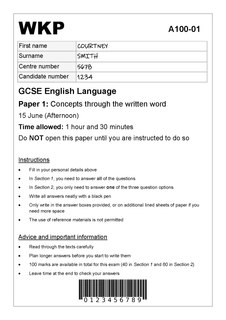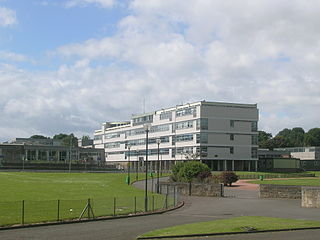
The General Certificate of Secondary Education (GCSE) is an academic qualification in a particular subject, taken in England, Wales, and Northern Ireland. State schools in Scotland use the Scottish Qualifications Certificate instead. Private schools in Scotland may choose to use an alternative qualification.
In the education systems of England, Northern Ireland, Wales, Jamaica and some other Commonwealth countries, sixth form represents the final two years of secondary education, where students start the first academic year of the sixth form aged 16 and finish aged 17 at the end of that academic year then subsequently start the second academic year of the sixth form aged 17 and finish aged 18. During the two years the pupils typically prepare for A-level or sometimes equivalent examinations like the IB or Pre-U. In England, Wales, and Northern Ireland, the term Key Stage 5 has the same meaning. It only refers to post-16 academic education and not to vocational education.
The General Certificate of Education (GCE) is a subject-specific family of academic qualifications used in awarding bodies in England, Wales, Northern Ireland, Crown dependencies and a few Commonwealth countries. For some time, the Scottish education system has been different from those in the other countries of the United Kingdom.

The Scottish Qualifications Authority is the executive non-departmental public body of the Scottish Government responsible for accrediting educational awards. It is partly funded by the Education and Lifelong Learning Directorate of the Scottish Government, and employs approximately 750 staff based in Glasgow and Dalkeith.
Standard Grades were Scotland's educational qualifications for students aged around 14 to 16 years. Introduced in 1986, the Grades were replaced in 2013 with the Scottish Qualifications Authority's National exams in a major shake-up of Scotland's education system as part of the Scottish Credit and Qualifications Framework overhaul.
In the Scottish secondary education system, the Higher is one of the national school-leaving certificate exams and university entrance qualifications of the Scottish Qualifications Certificate (SQC) offered by the Scottish Qualifications Authority. It superseded the old Higher Grade on the Scottish Certificate of Education (SCE). Both are normally referred to simply as "Highers".
The National Certificate of Educational Achievement (NCEA) is the official secondary-school qualification in New Zealand. Phased in between 2002 and 2004, it replaced three older secondary-school qualifications. The New Zealand Qualifications Authority administers NCEA.
Music examinations are a method of formally assessing the accomplishments of pupils learning musical instruments. These are called grades.
The Certificate of Secondary Education (CSE) was a subject-specific qualification family awarded in both academic and vocational fields in England, Wales and Northern Ireland. CSE examinations were held in the years 1965 to 1987. This qualification should not be confused with the Indian Certificate of Secondary Education which is the school leaving qualification in India. Also, in some African and former British colonial countries there is a qualification named the Certificate of Secondary Education based on the original and former British variant. Also, the CSE should not be confused with the African qualification CSEE.
The Advanced Higher is an optional qualification which forms part of the Scottish secondary education system brought in to replace the Certificate of Sixth Year Studies (CSYS). The first certification of Advanced Higher was in 2001. It is normally taken by students aged around 16–18 years of age after they have completed Highers, which are the main university entrance qualification in Scotland.
Intermediate 1 is an educational qualification in Scotland on the Scottish Qualifications Authority (SQA) Scottish Qualifications Certificate (SQC) achievement ladder similar to General Level at Standard Grades; it is the next step after Access 3. It is delivered by the majority of Scottish secondary schools as part of the Higher Still reforms instituted in 2000 by the SQA and the Scottish Executive.

National Assessment Banks, commonly referred to as NABs after the National Assessment Bank from which these assessments are selected by teachers, are internal assessments that used to form part of the Scottish Higher and Intermediate courses. These were assessed by a centre and are moderated by the Scottish Qualifications Authority. Candidates sitting a courses at Intermediate 1, Intermediate 2, Higher and Advanced Higher levels were required to have passed a NAB for each unit in order to sit the end of course examination. The NAB examinations are, as of 2010, no longer compulsory, and pupils can sit the final examination without sitting a NAB. Often, pupils must pass a prelim to sit the final exam.

The A Level is a subject-based qualification conferred as part of the General Certificate of Education, as well as a school leaving qualification offered by the educational bodies in the United Kingdom and the educational authorities of British Crown dependencies to students completing secondary or pre-university education. They were introduced in England and Wales in 1951 to replace the Higher School Certificate.
National Qualifications (NQs) are qualifications studied in secondary schools and colleges of further education in Scotland. There used to be three types of National Qualification - Standard Grades, National Courses and National Units. For the most up-to-date information about Scottish qualifications, please visit the pages of the Scottish Qualification Authority.
In the UK education sector, there are a wide range of qualification types offered by the United Kingdom awarding bodies. Qualifications range in size and type, can be academic, vocational or skills-related, and are grouped together into different levels of difficulty. In England, Wales and Northern Ireland, qualifications are divided into Higher Education qualifications, which are on the Framework for Higher Education Qualifications (FHEQ) and are awarded by bodies with degree awarding powers, and Regulated qualifications, which are on the Regulated Qualifications Framework (RQF) and are accredited by Ofqual in England, the Council for the Curriculum, Examinations and Assessment in Northern Ireland and Qualifications Wales in Wales. In Scotland, qualifications are divided into Higher Education qualifications, Scottish Qualifications Authority qualifications and Scottish Vocational Qualifications/Modern Apprenticeships, which are on the Scottish Credit and Qualifications Framework (SCQF). Scottish Higher Education Qualifications are on both the SCQF and the FHEQ.
The General Certificate of Education (GCE) Advanced Level, or A Level, is a main school leaving qualification in England, Wales, Northern Ireland, the Channel Islands and the Isle of Man. It is available as an alternative qualification in other countries.

Secondary education in Scotland can take up to 6 years, covering ages 11 to 18, from S1 to S6. Education is not compulsory after the age of 16, the age of majority in Scots law.
A high school diploma or high school degree is a North American academic school leaving qualification awarded upon high school graduation. The high school diploma is typically obtained after a course of study lasting four years, from grade 9 to grade 12. The diploma is awarded by the school in accordance with the requirements of the local state or provincial government. Requirements for earning the diploma vary by jurisdiction, and there may be different requirements for different streams or levels of high school graduation. Typically they include a combination of selected coursework meeting specified criteria for a particular stream and acceptable passing grades earned on the state exit examination.
Junior Cycle is the first stage of the education programme for post-primary education within the Republic of Ireland. It is overseen by the State Examinations Commission of the Department of Education, the State Examinations Commission and the National Council for Curriculum and Assessment (NCCA).




